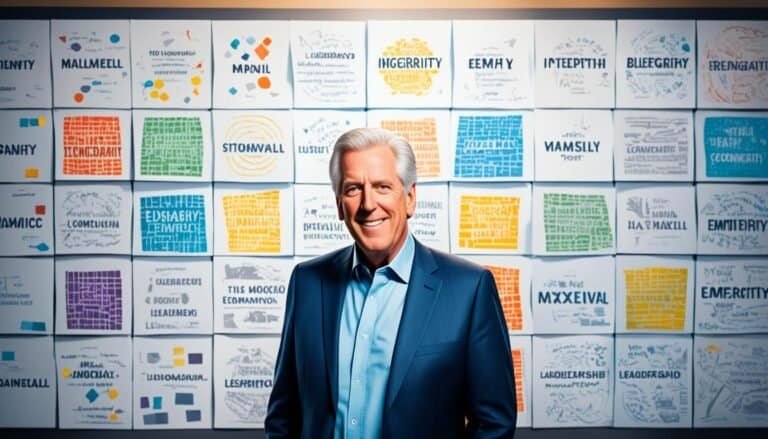Michelle Obama's Leadership Lessons: Inspiring Change and Empowerment
You might think leadership lessons from Michelle Obama are just about diplomacy and grace, but there's more to uncover beneath the surface. Her ability to navigate challenges with resilience and authenticity offers a blueprint for anyone looking to make a difference.
From prioritizing education to embracing diversity, each aspect of her leadership style holds a key to unlocking your own potential and effecting change in your sphere of influence. Whether you aspire to lead a community, organization, or simply your own life, Michelle Obama's insights are a treasure trove waiting to be explored.
Key Takeaways
- Embrace authenticity and integrity to lead with transparency and trust.
- Build resilient communities through collaboration, shared responsibility, and positivity.
- Utilize platforms for advocacy, amplify impact, and drive meaningful change.
- Pay it forward through mentorship, support, and empowerment for leadership development.
Early Influences and Values
As Michelle Obama's journey unfolded, her early influences and values shaped the foundation of her leadership approach. Raised in a close-knit family, she learned the importance of hard work, perseverance, and empathy from her parents. These family values instilled in her a sense of duty and service to others from a young age.
Michelle's childhood influences, such as growing up in Chicago's South Side, exposed her to the realities of inequality and social injustice, igniting a passion for advocacy and change.
Her upbringing in a supportive environment where education was highly valued laid the groundwork for her commitment to empowering others through knowledge and opportunity. Michelle Obama's experiences with diversity and inclusivity during her formative years influenced her inclusive leadership style, emphasizing the importance of listening to diverse perspectives and fostering unity.
Leading With Authenticity
Michelle Obama's leadership style is exemplified by her commitment to leading with authenticity, showcasing a genuine and transparent approach in her interactions and decision-making. Authentic leadership involves staying true to oneself, values, and beliefs while inspiring others to do the same. Michelle Obama's ability to connect with people on a personal level and share her authentic self has had a genuine impact on those around her.
| Authentic Leadership | Genuine Impact |
|---|---|
| Being true to oneself and values | Inspiring others to be authentic |
| Building trust through transparency | Fostering genuine connections |
| Leading with integrity and honesty | Creating a positive impact on individuals and communities |
Prioritizing Education and Advocacy
When looking at Michelle Obama's leadership style, it's clear that she emphasizes the importance of education for all individuals.
She advocates for meaningful change through education and empowers voices that mightn't otherwise be heard.
Prioritizing education and advocacy are key pillars in her approach to leadership, showing a dedication to fostering positive growth and progress.
Education for All
Prioritizing education and advocacy is essential for achieving the goal of education for all. Accessible learning opportunities ensure that individuals from diverse backgrounds can participate in educational activities without barriers.
Inclusive classrooms foster an environment where every student feels valued and respected, regardless of their differences. Michelle Obama's commitment to education emphasizes the significance of providing equal educational opportunities for all individuals.
Advocacy for Change
Advocating for change in educational systems is crucial for fostering inclusivity and ensuring equal opportunities for all individuals. Policy reform plays a significant role in reshaping the educational landscape to address disparities and promote equity.
By advocating for policy reform, individuals can push for changes that enhance access to quality education and support marginalized communities. Grassroots activism also plays a vital role in advocating for change by mobilizing communities and amplifying voices that may otherwise go unheard.
Through grassroots efforts, individuals can bring attention to pressing issues within the education system and push for meaningful reforms that benefit all students. Michelle Obama's advocacy for change exemplifies how individuals can drive impactful transformations in education through collective action and unwavering dedication.
Empowering Voices Through Education
To empower voices through education, individuals must actively engage in advocacy efforts to amplify diverse perspectives and drive positive change in society. Educational empowerment plays a crucial role in fostering inclusive dialogues and encouraging critical thinking.
By prioritizing education and advocacy, you can contribute to creating a more equitable and informed community. Amplifying voices through education involves providing platforms for marginalized groups to share their experiences and insights. It's through this exchange of ideas that meaningful progress can be achieved.
Building Strong Communities
Building strong communities requires active participation and collaboration among individuals with a shared vision for positive change. Community engagement, volunteerism, building trust, and collaboration are essential elements in creating a cohesive and supportive environment where everyone can thrive. By coming together and pooling resources, communities can address challenges, celebrate successes, and foster a sense of belonging.
| Community Engagement | Building Trust |
|---|---|
| – Involvement in local projects | – Honest communication |
| – Active participation in community events | – Reliability and consistency |
| – Volunteering time and skills | – Respecting diverse perspectives |
| – Supporting local businesses | – Transparency in decision-making |
| – Collaborating on initiatives | – Accountability to the community |
These actions not only strengthen the bonds among community members but also create a sense of shared responsibility and unity. When individuals work together towards a common goal, they can overcome obstacles, inspire positive change, and build a resilient community that uplifts everyone within it.
Embracing Diversity and Inclusion
Embracing diversity and inclusion fosters a sense of belonging and acceptance within communities, nurturing an environment where differences are celebrated and all voices are valued. Diversity initiatives and inclusion strategies are essential components in creating a space where individuals from various backgrounds feel respected and empowered. By promoting cultural awareness and implementing equity practices, organizations can ensure that all members feel included and have equal opportunities for growth and success.
Effective diversity initiatives involve actively seeking out perspectives from individuals of different ethnicities, genders, religions, and backgrounds. It's about recognizing the unique strengths that each person brings to the table and leveraging these differences to drive innovation and creativity. Inclusion strategies, on the other hand, focus on creating a supportive environment where everyone feels heard and valued.
Resilience in the Face of Adversity
When facing difficult times, Michelle Obama exemplifies the essence of resilience by:
- Overcoming challenges with grace
- Demonstrating unwavering strength through tough situations
- Showcasing perseverance in the face of adversity
Her ability to navigate obstacles with poise and determination serves as a powerful lesson in resilience, inspiring others to confront challenges head-on and emerge stronger on the other side.
Overcoming Challenges With Grace
In the face of adversity, displaying resilience with grace is a key leadership trait exemplified by Michelle Obama. Graceful resilience is about navigating challenges with a sense of poise and dignity, even in the toughest of times.
Michelle Obama's ability to overcome obstacles with grace has inspired many to face their own challenges head-on. Whether it was addressing criticism, dealing with personal struggles, or advocating for important causes, she's shown that maintaining composure and strength in difficult situations can lead to positive outcomes.
Strength Through Tough Times
Navigating through tough times requires a blend of inner strength and external support to maintain resilience in the face of adversity. Finding inner strength within yourself is essential when facing challenges.
Michelle Obama's leadership teaches us that staying resilient in difficult times is a powerful tool for personal growth and empowerment. By navigating challenges with determination, you can overcome obstacles that may come your way.
It's important to remember that setbacks are a natural part of any journey, and developing resilience can help you bounce back stronger. Drawing inspiration from Michelle Obama's ability to persevere through adversity, you can learn to weather storms and emerge even more resilient on the other side.
Perseverance in Adversity
Drawing from Michelle Obama's example, developing resilience in the face of adversity is a key aspect of persevering through challenges and emerging stronger. Embracing a perseverance mindset can help you navigate difficult situations with grace and determination. Adversity resilience enables you to bounce back from setbacks, learn from failures, and grow personally and professionally. Michelle Obama's journey exemplifies the power of staying resilient in the face of adversity, inspiring others to push through tough times. Below is a table outlining key strategies to cultivate a perseverance mindset and enhance your ability to overcome obstacles:
| Perseverance Mindset | Adversity Resilience |
|---|---|
| Embrace challenges as opportunities for growth | Stay positive and focused during tough times |
| Set realistic goals and stay motivated | Seek support from others and practice self-care |
| Learn from failures and adapt | Develop problem-solving skills and flexibility |
| Stay committed to your values and beliefs | Celebrate small victories and milestones |
Leveraging Platforms for Change
Utilizing the power of existing platforms can amplify the impact of efforts aimed at driving positive change. When it comes to social impact and grassroots movements, leveraging platforms effectively becomes crucial. Here's how you can make the most out of existing platforms for change:
- Utilize social media: Harness the reach and connectivity of social media platforms to spread awareness, mobilize support, and amplify your message.
- Collaborate with established organizations: Partnering with well-established organizations can provide resources, expertise, and a broader reach for your cause.
- Engage with traditional media: Utilize traditional media outlets such as newspapers, TV, and radio to reach a wider audience and generate momentum for your initiatives.
- Leverage influential figures: Engaging with influencers and leaders in various fields can help bring attention to your cause and inspire others to join your efforts.
Mentorship and Paying It Forward
To further empower your impact and cultivate a legacy of positive change, consider the transformative influence of mentorship and the ethos of paying it forward. Mentorship plays a crucial role in personal and professional development, offering guidance, support, and knowledge transfer. The impact of a mentor can be profound, aiding in skill development, confidence building, and career advancement. Through mentorship, individuals can tap into valuable insights and experiences, accelerating their growth and empowerment.
When you engage in mentorship, you not only benefit from the wisdom of others but also have the opportunity to pay it forward. By sharing your knowledge, skills, and experiences with others, you contribute to their leadership development and overall success. This act of giving back creates a ripple effect, fostering a culture of support and empowerment within your community or organization.
| Mentorship Impact | Empowerment Growth |
|---|---|
| Offers guidance and support | Accelerates skill development |
| Facilitates knowledge transfer | Builds confidence |
| Aids in career advancement | Fosters personal growth |
Conclusion
In conclusion, Michelle Obama's leadership lessons highlight the importance of authenticity, education, advocacy, community building, diversity, resilience, and leveraging platforms for change.
While some may argue that her approach may not work for everyone, it's clear that her values and actions have inspired countless individuals to make a difference in their own communities.
By embodying these principles and paying it forward through mentorship, we can all work towards a more empowered and inclusive society.







